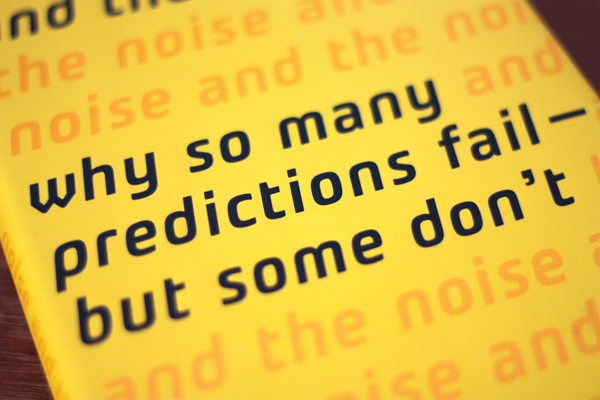I make sure to work plenty of non-fiction into my reading list, but I've come to mistrust the Post-Colon books. You know, those books that can't leave well enough alone with just a title, and must insert a colon and unwieldy description to really hammer home their point (or more likely, their polemic argument). Lately, though, I've allowed a couple of Post-Colon books to slip through the filter, because they both sounded pretty interesting.
First up was Nate Silver's The Signal and the Noise: Why Most Predictions Fail - But Some Don't (2012). See what I mean with that? It's a book by Nate Silver, the terms "signal" and "noise" are heavily used in the field of predictions, and researching what books are about is pretty simple with a little help from our old pal Internet. What possible need is there for that post-colon description? Nate Silver, for anyone who doesn't know by now, is the guy who builds predictive models about all sorts of topics, but is probably best known for correctly forecasting how all 50 states would wind up voting in the 2012 election. I'd seen him in a couple of interviews and read a couple of his blog posts, and he seemed like a really interesting guy, so when I heard he'd written a book about professional forecasting and the problems within that field, I was immediately intrigued.
The book certainly didn't let me down in terms of its range of topics. Naturally, electoral predictions were a big reason of why I wanted to read it, and Silver doesn't shy away from exploring why political pundits are so often colossally wrong in their predictions, but never seem to learn from their errors. He's not partisan about it; he's interested in probability and mathematical precedent, not talking points and speech gaffes. It was a fascinating chapter, but the book doesn't just explore political predictions. If there's something that people make a living trying to forecast, it's covered.
Chess. Financial markets, including the Great Recession. Weather prediction. Baseball. Terrorism. Earthquakes. Poker. All of these involve trying to figure out what's coming next, and the methods people have developed to deal with the unknowns vary wildly in terms of their success. Weather prediction has come a long way in the past couple of decades, but we're still hopeless at figuring out when the next earthquake will hit. It's not dry math. Even if successful predictive models exist, translating things like hurricane warnings into useful public policy can be a challenge, and the book goes into that as well. It was a very interesting read, and a handy reminder that our society could do with a lot more fact-sifting, and a lot less reactive emotion.
The Signal and the Noise was not a politically strident book, but the same cannot be said for Dan Savage's American Savage: Insights, Slights, and Fights on Faith, Sex, Love, and Politics (2013). Jesus, with the post-colon descriptions already. Savage is a controversial figure, not only in society as a whole, but in my groups of friends as well. I listen to and usually enjoy his weekly podcast, but several people I've talked to about him find him overly pugnacious, crass, or believe that he gives poor advice. I don't always agree with his advice, myself, but I find him to be a welcome voice, because aside from being a strong political ally, he's one of the few advice-givers who accepts the practicalities of love and sex, and doesn't force people into a rigid set of rules that enshrine a monolithic Path to Happiness.
Like Silver, his book encompasses a range of topics, all but one of which make sense within the context of his life and career. He covers personal stories, like his complicated relationship with Catholicism, the death of his mother, and his rearing of a straight teenager. There are also plenty of chapters that apply to his involvement in issues that affect us all, like gay marriage, the hypocrisy of bigoted Christians (naturally, bigotry is not limited to Christianity, but let's not harbor any illusions about who's throwing the biggest rocks at us in America), and the It Gets Better campaign, which reaches out to gay teenagers who can't see a life beyond the hell of their tortured adolescence.
It was a pretty good read, although most of the arguments made were things that I'd already caught up on as a regular listener of the podcast. Also, note how I said above how "all but one" of his chapters make sense. I consider Savage a pretty established expert on many topics, but American gun laws are not one of them. Not that I particularly disagree with his positions on the matter, and not that he's not allowed to have opinions on it, but... I'm not reading a book by a guy famous for his career in love and sex to get talking points on the grim circumstances of mass shootings. It was an odd chapter, forced into the book without really fitting into it - it was like running across a diatribe about abortion in the middle of a cookbook. Aside from that minor quibble, I liked it. In fact, both of these books were very enjoyable. That said, I think I've had my fill of Post-Colons for a while.
The Signal and the Noise: B+
American Savage: B
Subscribe to:
Post Comments (Atom)




0 comments:
Post a Comment